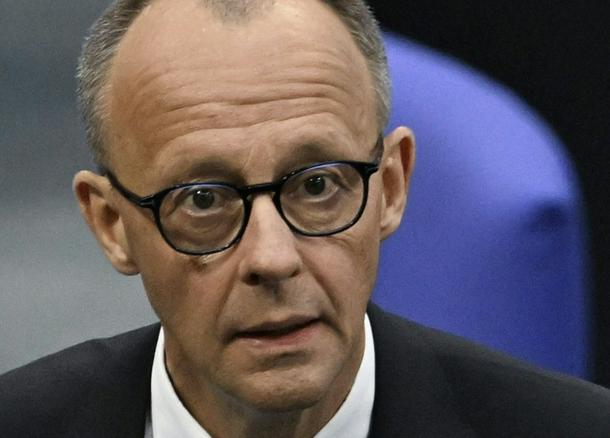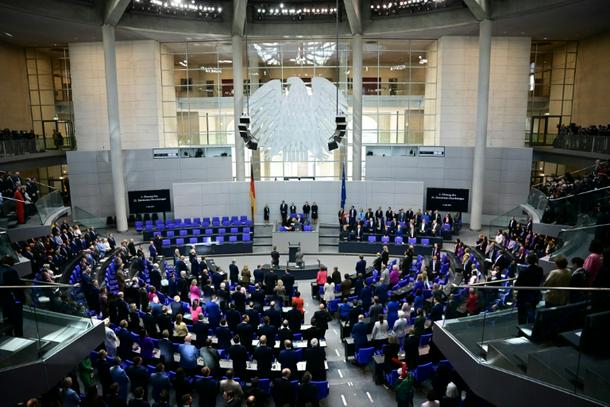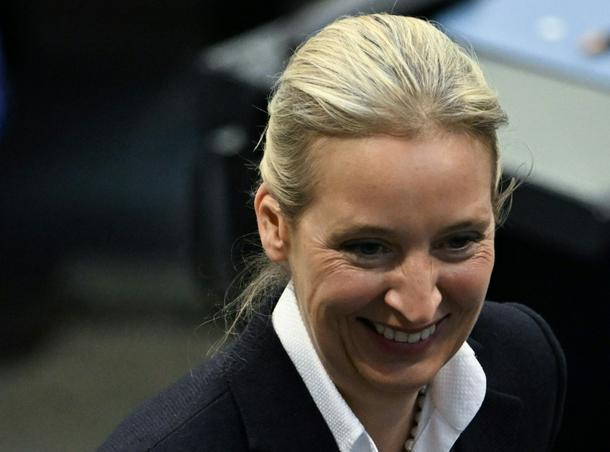
Merz failed to win a majority to become chancellor in a first vote in parliament
Berlin (AFP) - Germany’s conservative leader Friedrich Merz suffered a serious blow on Tuesday when he failed to win a parliamentary majority in the first round of voting to become the next chancellor.
The unexpected setback – a first in German post-war history – prolongs the half-year of political paralysis in Berlin since the collapse of the coalition government of Olaf Scholz, which sparked elections in February.
Hoping to become modern Germany’s 10th chancellor, election winner Merz has vowed to revive the ailing economy and strengthen Berlin’s role in Europe as it responds to heightened geopolitical turbulence since US President Donald Trump returned to power.
But Tuesday’s parliament vote, which had been widely seen as a formality, sparked fresh turmoil and pointed to dissent within the ranks of the two-party coalition hoping to rule Germany.
To take over as chancellor, Merz needed an absolute majority of 316 of the 630 lower house votes in the secret ballot. But he only won the backing of 310 MPs, with 307 voting against him.

The Bundestag has 630 members of parliament
His CDU urged a second round vote as early as Tuesday but no new date had been set. Other parliamentary factions would have to agree to hold a fresh vote before Friday.
According to the constitution a second round of voting has to take place within 14 days.
If that fails, then a third phase would take place in which a simple majority of lawmakers – with yes votes outnumbering no votes – would suffice to see Merz elected.
“Merz will most likely still be elected as chancellor in the end,” wrote analyst Holger Schmieding of Berenberg Bank.
“But even so, the unprecedented failure to be elected in the first round would still be a bad start for him. It shows that he cannot fully rely on his two coalition parties.
“That will sow some doubts about his ability to fully pursue his agenda, damaging his domestic and international authority at least initially.”
- Far-right cheers -
Capital Economics analyst Franziska Palmas also argued that Merz’s setback “will probably not prevent him and the Grand Coalition from taking power in the coming days or weeks.

The AfD of co-leader Alice Weidel has been designated a 'right-wing extremist' party
“However, it does leave Merz severely weakened and suggests that hopes for more stability in German politics may be disappointed and that the government may struggle to push through its economic policy agenda.”
Merz had relied on unified backing of a coalition of his CDU/CSU alliance, which won February’s general elections, and the centre-left Social Democrats (SPD) of Scholz, who together have 328 seats.
Of the 630 MPs in the lower house, three lawmakers abstained, nine were absent and there was one invalid ballot paper.
The far-right Alternative for Germany (AfD) – the largest opposition party, which scored a record result of over 20 percent in the election – cheered the surprise result.
“Merz should step aside and the way should be cleared for a general election,” said AfD co-leader Alice Weidel, calling the result a “good day for Germany”.
The result keeps Scholz in the post of caretaker chancellor for now and has upended the political calendar in Berlin.
President Frank-Walter Steinmeier had been due to swear in the new cabinet and Merz had planned visits to Paris and Warsaw on Wednesday.
Bodo Ramelow of the far-left opposition party Die Linke said he was “angry” that Merz and his designated vice chancellor Lars Klingbeil of the SPD “allowed such a situation” to come about.
- ‘Profound upheaval’ -

US President Donald Trump has upended US relations with Europe
Germany’s political drama has come at a time when Trump has upended long-standing transatlantic security and trade ties and rattled allies by reaching out directly to Russia to end the Ukraine war.
Trump has heaped pressure on European allies, complaining that they spend too little on NATO.
He has also accused them of taking advantage of the United States by running trade surpluses and has imposed tariffs, a move especially painful to export power Germany.
Merz, who boasts a strong business background but has never held a government leadership post, said on Monday: “We live in times of profound change, of profound upheaval… and of great uncertainty.
“And that is why we know that it is our historic obligation to lead this coalition to success,” he said.
Expecting to take power, the coalition has already secured hundreds of billions of euros (dollars) in fiscal firepower under a spending “bazooka” passed by the outgoing parliament.
Their stated aim is to rebuild crumbling infrastructure and the long-underfunded military, while boosting an economy which has shrunk for the past two years.
The head of the Council of Economic Experts that advises the government, Monika Schnitzer, urged a quick solution, saying that “any form of uncertainty is poison for the economy”.